Taxation System Analysis and Liabilities for Ford Motor PLC Report
VerifiedAdded on 2021/01/01
|13
|3549
|137
Report
AI Summary
This report provides a comprehensive analysis of taxation systems and liabilities, using Ford Motor PLC as a case study. It begins with an introduction to taxation and its significance, followed by an examination of the taxation systems in the UK, US, and Hungary, with a focus on direct and indirect taxes. The report then delves into the taxation liabilities of both unincorporated and incorporated organizations, providing examples and calculations to illustrate the concepts. It explores the advantages and disadvantages of each organizational structure in relation to taxation. The report also covers the personal income tax of Henry Ford, and concludes with an analysis of key legal and ethical constraints on different organizations. The report includes calculations, comparisons, and real-world examples to provide a thorough understanding of the subject matter.
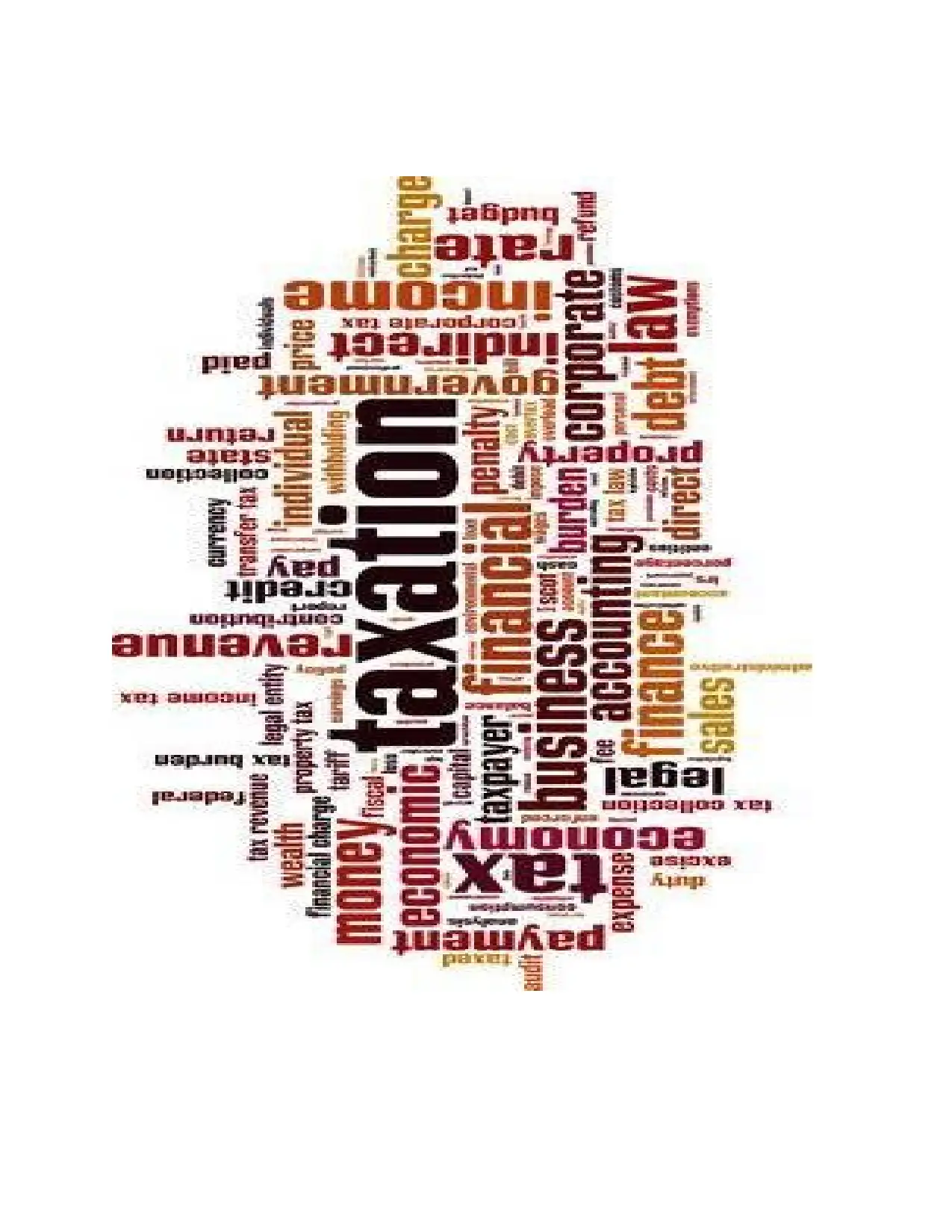
Paraphrase This Document
Need a fresh take? Get an instant paraphrase of this document with our AI Paraphraser
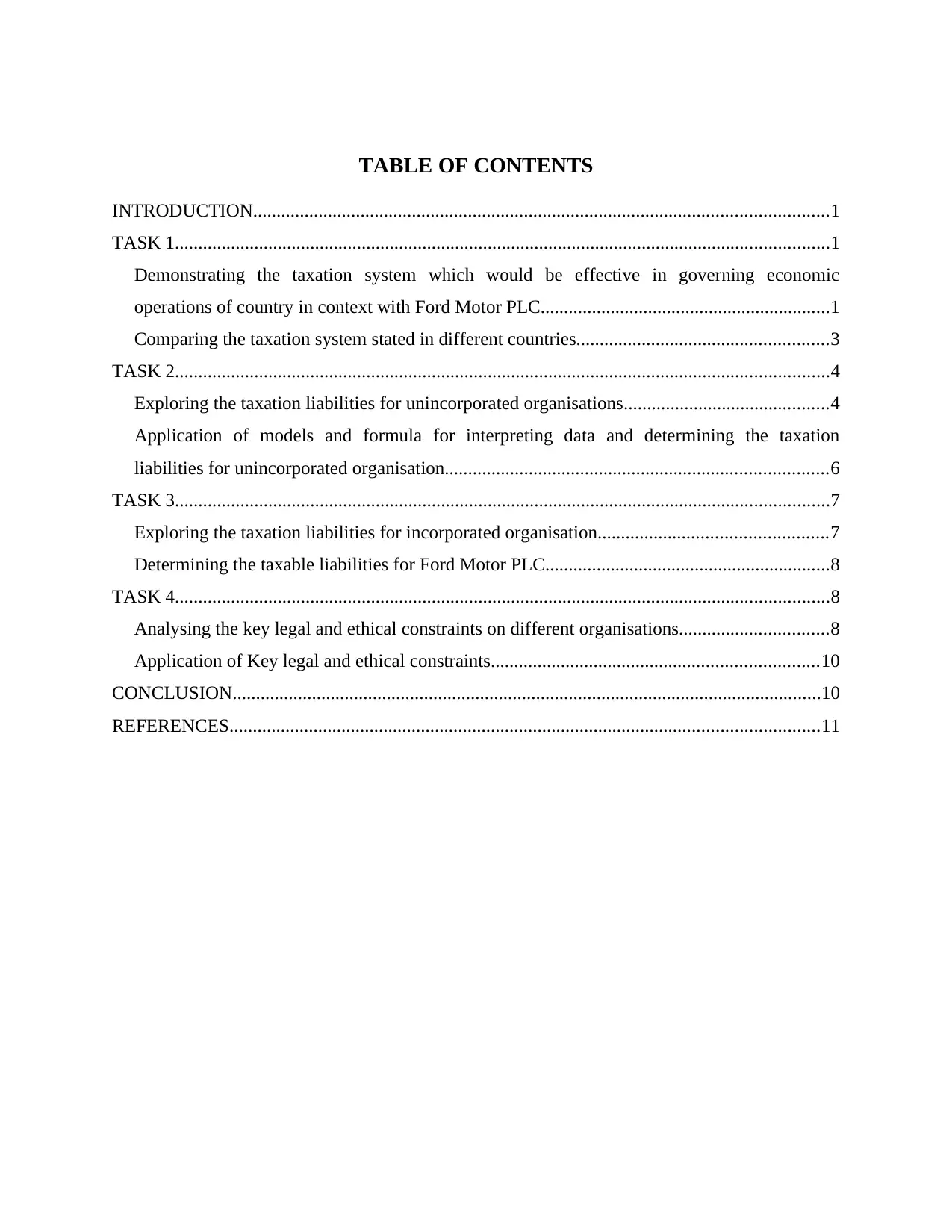
TABLE OF CONTENTS
INTRODUCTION...........................................................................................................................1
TASK 1............................................................................................................................................1
Demonstrating the taxation system which would be effective in governing economic
operations of country in context with Ford Motor PLC..............................................................1
Comparing the taxation system stated in different countries......................................................3
TASK 2............................................................................................................................................4
Exploring the taxation liabilities for unincorporated organisations............................................4
Application of models and formula for interpreting data and determining the taxation
liabilities for unincorporated organisation..................................................................................6
TASK 3............................................................................................................................................7
Exploring the taxation liabilities for incorporated organisation.................................................7
Determining the taxable liabilities for Ford Motor PLC.............................................................8
TASK 4............................................................................................................................................8
Analysing the key legal and ethical constraints on different organisations................................8
Application of Key legal and ethical constraints......................................................................10
CONCLUSION..............................................................................................................................10
REFERENCES..............................................................................................................................11
INTRODUCTION...........................................................................................................................1
TASK 1............................................................................................................................................1
Demonstrating the taxation system which would be effective in governing economic
operations of country in context with Ford Motor PLC..............................................................1
Comparing the taxation system stated in different countries......................................................3
TASK 2............................................................................................................................................4
Exploring the taxation liabilities for unincorporated organisations............................................4
Application of models and formula for interpreting data and determining the taxation
liabilities for unincorporated organisation..................................................................................6
TASK 3............................................................................................................................................7
Exploring the taxation liabilities for incorporated organisation.................................................7
Determining the taxable liabilities for Ford Motor PLC.............................................................8
TASK 4............................................................................................................................................8
Analysing the key legal and ethical constraints on different organisations................................8
Application of Key legal and ethical constraints......................................................................10
CONCLUSION..............................................................................................................................10
REFERENCES..............................................................................................................................11
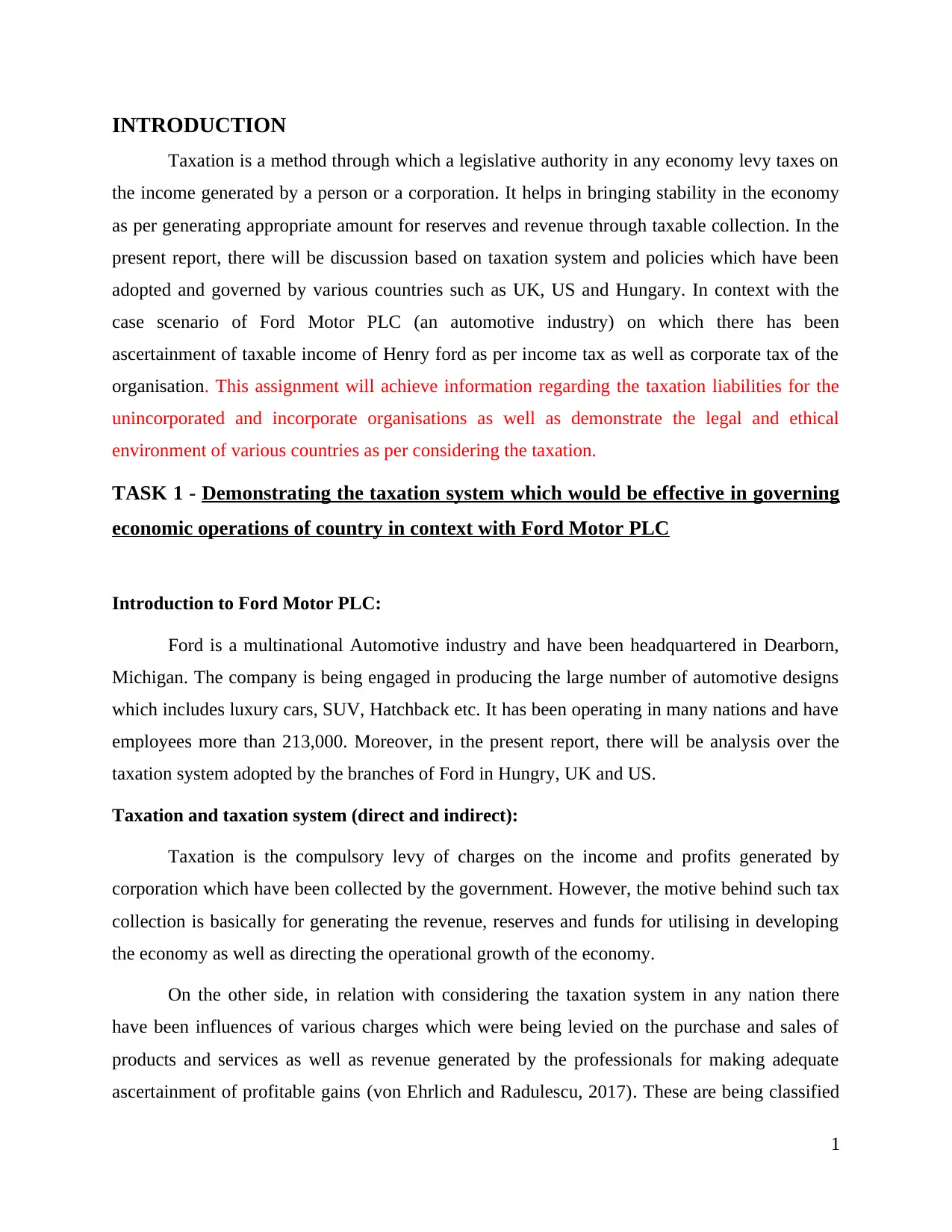
INTRODUCTION
Taxation is a method through which a legislative authority in any economy levy taxes on
the income generated by a person or a corporation. It helps in bringing stability in the economy
as per generating appropriate amount for reserves and revenue through taxable collection. In the
present report, there will be discussion based on taxation system and policies which have been
adopted and governed by various countries such as UK, US and Hungary. In context with the
case scenario of Ford Motor PLC (an automotive industry) on which there has been
ascertainment of taxable income of Henry ford as per income tax as well as corporate tax of the
organisation. This assignment will achieve information regarding the taxation liabilities for the
unincorporated and incorporate organisations as well as demonstrate the legal and ethical
environment of various countries as per considering the taxation.
TASK 1 - Demonstrating the taxation system which would be effective in governing
economic operations of country in context with Ford Motor PLC
Introduction to Ford Motor PLC:
Ford is a multinational Automotive industry and have been headquartered in Dearborn,
Michigan. The company is being engaged in producing the large number of automotive designs
which includes luxury cars, SUV, Hatchback etc. It has been operating in many nations and have
employees more than 213,000. Moreover, in the present report, there will be analysis over the
taxation system adopted by the branches of Ford in Hungry, UK and US.
Taxation and taxation system (direct and indirect):
Taxation is the compulsory levy of charges on the income and profits generated by
corporation which have been collected by the government. However, the motive behind such tax
collection is basically for generating the revenue, reserves and funds for utilising in developing
the economy as well as directing the operational growth of the economy.
On the other side, in relation with considering the taxation system in any nation there
have been influences of various charges which were being levied on the purchase and sales of
products and services as well as revenue generated by the professionals for making adequate
ascertainment of profitable gains (von Ehrlich and Radulescu, 2017). These are being classified
1
Taxation is a method through which a legislative authority in any economy levy taxes on
the income generated by a person or a corporation. It helps in bringing stability in the economy
as per generating appropriate amount for reserves and revenue through taxable collection. In the
present report, there will be discussion based on taxation system and policies which have been
adopted and governed by various countries such as UK, US and Hungary. In context with the
case scenario of Ford Motor PLC (an automotive industry) on which there has been
ascertainment of taxable income of Henry ford as per income tax as well as corporate tax of the
organisation. This assignment will achieve information regarding the taxation liabilities for the
unincorporated and incorporate organisations as well as demonstrate the legal and ethical
environment of various countries as per considering the taxation.
TASK 1 - Demonstrating the taxation system which would be effective in governing
economic operations of country in context with Ford Motor PLC
Introduction to Ford Motor PLC:
Ford is a multinational Automotive industry and have been headquartered in Dearborn,
Michigan. The company is being engaged in producing the large number of automotive designs
which includes luxury cars, SUV, Hatchback etc. It has been operating in many nations and have
employees more than 213,000. Moreover, in the present report, there will be analysis over the
taxation system adopted by the branches of Ford in Hungry, UK and US.
Taxation and taxation system (direct and indirect):
Taxation is the compulsory levy of charges on the income and profits generated by
corporation which have been collected by the government. However, the motive behind such tax
collection is basically for generating the revenue, reserves and funds for utilising in developing
the economy as well as directing the operational growth of the economy.
On the other side, in relation with considering the taxation system in any nation there
have been influences of various charges which were being levied on the purchase and sales of
products and services as well as revenue generated by the professionals for making adequate
ascertainment of profitable gains (von Ehrlich and Radulescu, 2017). These are being classified
1
⊘ This is a preview!⊘
Do you want full access?
Subscribe today to unlock all pages.

Trusted by 1+ million students worldwide
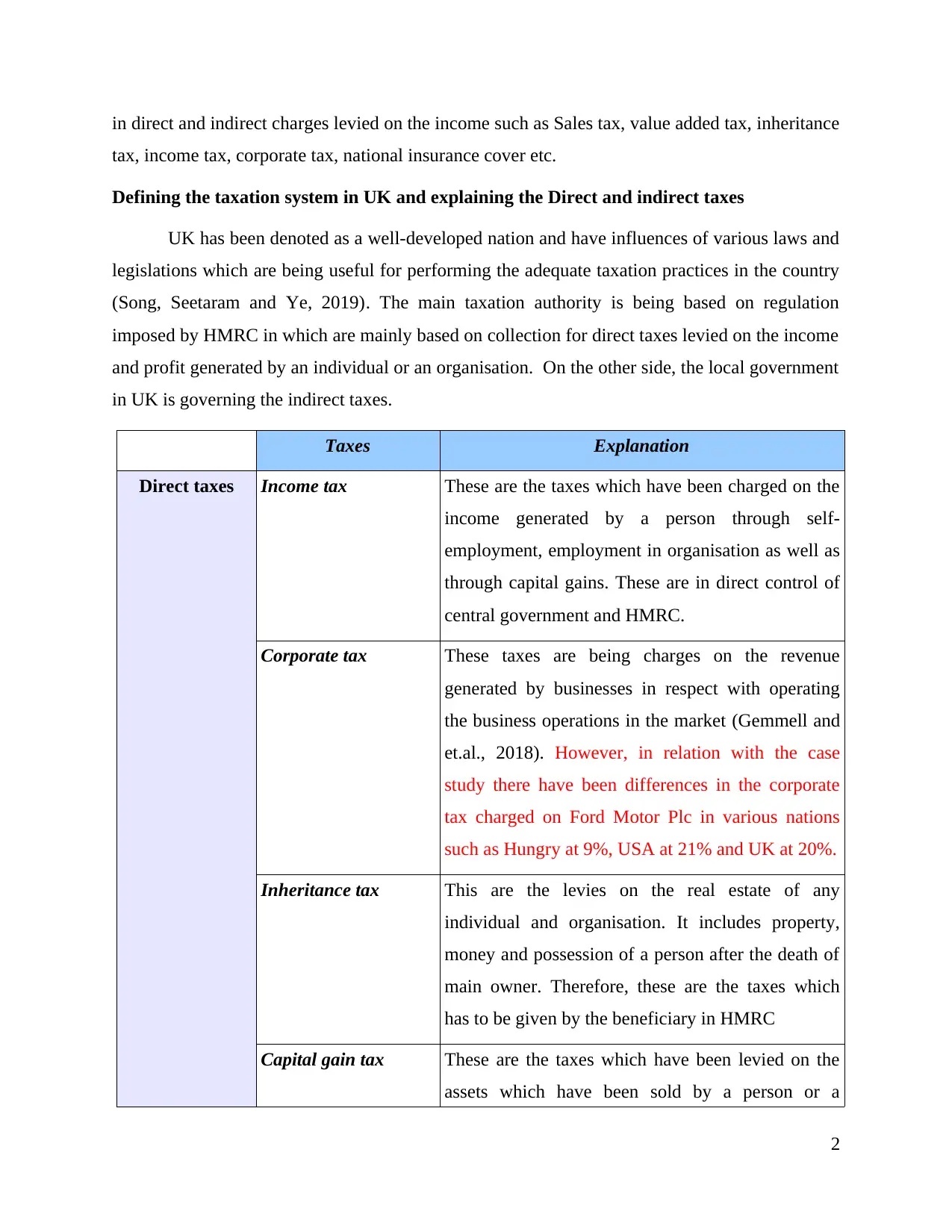
in direct and indirect charges levied on the income such as Sales tax, value added tax, inheritance
tax, income tax, corporate tax, national insurance cover etc.
Defining the taxation system in UK and explaining the Direct and indirect taxes
UK has been denoted as a well-developed nation and have influences of various laws and
legislations which are being useful for performing the adequate taxation practices in the country
(Song, Seetaram and Ye, 2019). The main taxation authority is being based on regulation
imposed by HMRC in which are mainly based on collection for direct taxes levied on the income
and profit generated by an individual or an organisation. On the other side, the local government
in UK is governing the indirect taxes.
Taxes Explanation
Direct taxes Income tax These are the taxes which have been charged on the
income generated by a person through self-
employment, employment in organisation as well as
through capital gains. These are in direct control of
central government and HMRC.
Corporate tax These taxes are being charges on the revenue
generated by businesses in respect with operating
the business operations in the market (Gemmell and
et.al., 2018). However, in relation with the case
study there have been differences in the corporate
tax charged on Ford Motor Plc in various nations
such as Hungry at 9%, USA at 21% and UK at 20%.
Inheritance tax This are the levies on the real estate of any
individual and organisation. It includes property,
money and possession of a person after the death of
main owner. Therefore, these are the taxes which
has to be given by the beneficiary in HMRC
Capital gain tax These are the taxes which have been levied on the
assets which have been sold by a person or a
2
tax, income tax, corporate tax, national insurance cover etc.
Defining the taxation system in UK and explaining the Direct and indirect taxes
UK has been denoted as a well-developed nation and have influences of various laws and
legislations which are being useful for performing the adequate taxation practices in the country
(Song, Seetaram and Ye, 2019). The main taxation authority is being based on regulation
imposed by HMRC in which are mainly based on collection for direct taxes levied on the income
and profit generated by an individual or an organisation. On the other side, the local government
in UK is governing the indirect taxes.
Taxes Explanation
Direct taxes Income tax These are the taxes which have been charged on the
income generated by a person through self-
employment, employment in organisation as well as
through capital gains. These are in direct control of
central government and HMRC.
Corporate tax These taxes are being charges on the revenue
generated by businesses in respect with operating
the business operations in the market (Gemmell and
et.al., 2018). However, in relation with the case
study there have been differences in the corporate
tax charged on Ford Motor Plc in various nations
such as Hungry at 9%, USA at 21% and UK at 20%.
Inheritance tax This are the levies on the real estate of any
individual and organisation. It includes property,
money and possession of a person after the death of
main owner. Therefore, these are the taxes which
has to be given by the beneficiary in HMRC
Capital gain tax These are the taxes which have been levied on the
assets which have been sold by a person or a
2
Paraphrase This Document
Need a fresh take? Get an instant paraphrase of this document with our AI Paraphraser
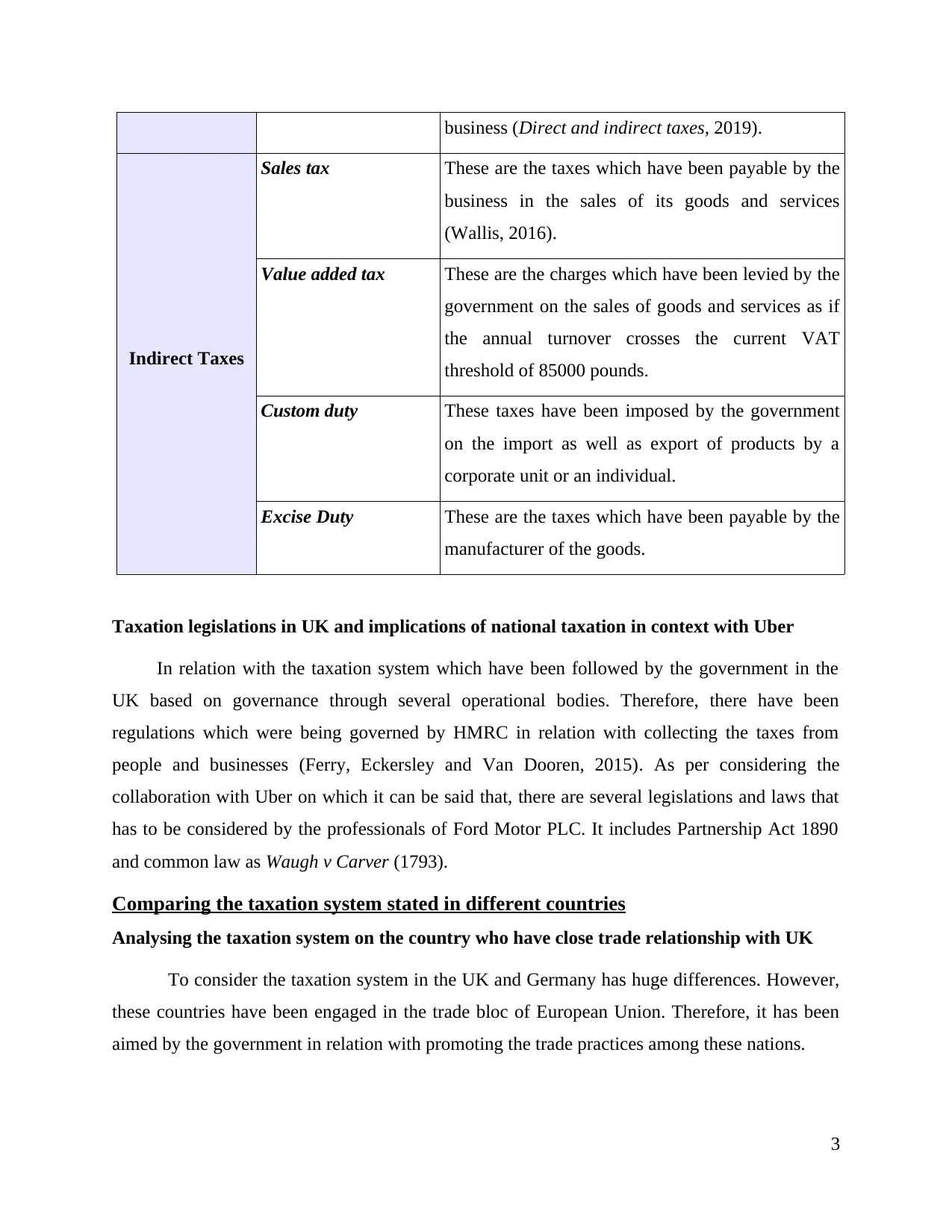
business (Direct and indirect taxes, 2019).
Indirect Taxes
Sales tax These are the taxes which have been payable by the
business in the sales of its goods and services
(Wallis, 2016).
Value added tax These are the charges which have been levied by the
government on the sales of goods and services as if
the annual turnover crosses the current VAT
threshold of 85000 pounds.
Custom duty These taxes have been imposed by the government
on the import as well as export of products by a
corporate unit or an individual.
Excise Duty These are the taxes which have been payable by the
manufacturer of the goods.
Taxation legislations in UK and implications of national taxation in context with Uber
In relation with the taxation system which have been followed by the government in the
UK based on governance through several operational bodies. Therefore, there have been
regulations which were being governed by HMRC in relation with collecting the taxes from
people and businesses (Ferry, Eckersley and Van Dooren, 2015). As per considering the
collaboration with Uber on which it can be said that, there are several legislations and laws that
has to be considered by the professionals of Ford Motor PLC. It includes Partnership Act 1890
and common law as Waugh v Carver (1793).
Comparing the taxation system stated in different countries
Analysing the taxation system on the country who have close trade relationship with UK
To consider the taxation system in the UK and Germany has huge differences. However,
these countries have been engaged in the trade bloc of European Union. Therefore, it has been
aimed by the government in relation with promoting the trade practices among these nations.
3
Indirect Taxes
Sales tax These are the taxes which have been payable by the
business in the sales of its goods and services
(Wallis, 2016).
Value added tax These are the charges which have been levied by the
government on the sales of goods and services as if
the annual turnover crosses the current VAT
threshold of 85000 pounds.
Custom duty These taxes have been imposed by the government
on the import as well as export of products by a
corporate unit or an individual.
Excise Duty These are the taxes which have been payable by the
manufacturer of the goods.
Taxation legislations in UK and implications of national taxation in context with Uber
In relation with the taxation system which have been followed by the government in the
UK based on governance through several operational bodies. Therefore, there have been
regulations which were being governed by HMRC in relation with collecting the taxes from
people and businesses (Ferry, Eckersley and Van Dooren, 2015). As per considering the
collaboration with Uber on which it can be said that, there are several legislations and laws that
has to be considered by the professionals of Ford Motor PLC. It includes Partnership Act 1890
and common law as Waugh v Carver (1793).
Comparing the taxation system stated in different countries
Analysing the taxation system on the country who have close trade relationship with UK
To consider the taxation system in the UK and Germany has huge differences. However,
these countries have been engaged in the trade bloc of European Union. Therefore, it has been
aimed by the government in relation with promoting the trade practices among these nations.
3
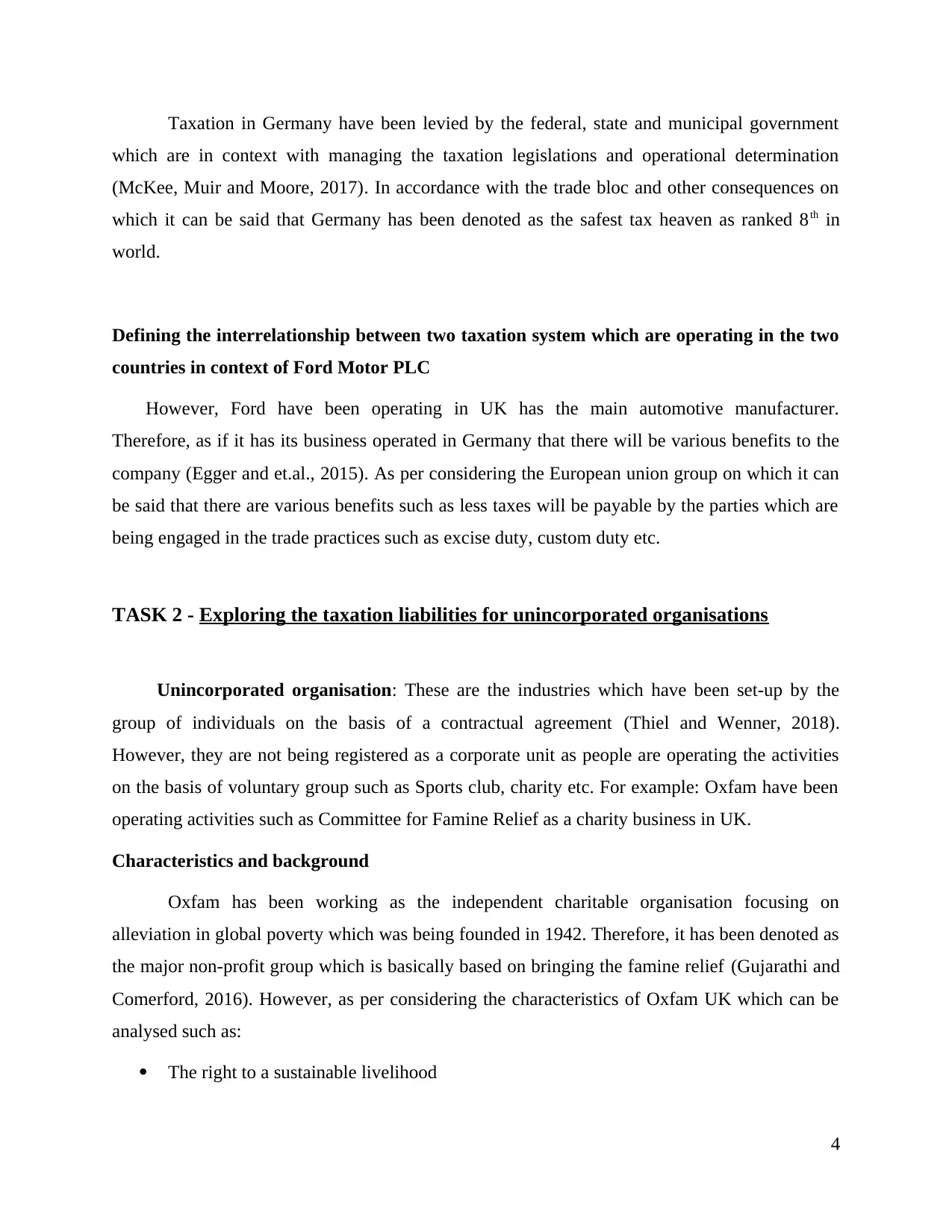
Taxation in Germany have been levied by the federal, state and municipal government
which are in context with managing the taxation legislations and operational determination
(McKee, Muir and Moore, 2017). In accordance with the trade bloc and other consequences on
which it can be said that Germany has been denoted as the safest tax heaven as ranked 8th in
world.
Defining the interrelationship between two taxation system which are operating in the two
countries in context of Ford Motor PLC
However, Ford have been operating in UK has the main automotive manufacturer.
Therefore, as if it has its business operated in Germany that there will be various benefits to the
company (Egger and et.al., 2015). As per considering the European union group on which it can
be said that there are various benefits such as less taxes will be payable by the parties which are
being engaged in the trade practices such as excise duty, custom duty etc.
TASK 2 - Exploring the taxation liabilities for unincorporated organisations
Unincorporated organisation: These are the industries which have been set-up by the
group of individuals on the basis of a contractual agreement (Thiel and Wenner, 2018).
However, they are not being registered as a corporate unit as people are operating the activities
on the basis of voluntary group such as Sports club, charity etc. For example: Oxfam have been
operating activities such as Committee for Famine Relief as a charity business in UK.
Characteristics and background
Oxfam has been working as the independent charitable organisation focusing on
alleviation in global poverty which was being founded in 1942. Therefore, it has been denoted as
the major non-profit group which is basically based on bringing the famine relief (Gujarathi and
Comerford, 2016). However, as per considering the characteristics of Oxfam UK which can be
analysed such as:
The right to a sustainable livelihood
4
which are in context with managing the taxation legislations and operational determination
(McKee, Muir and Moore, 2017). In accordance with the trade bloc and other consequences on
which it can be said that Germany has been denoted as the safest tax heaven as ranked 8th in
world.
Defining the interrelationship between two taxation system which are operating in the two
countries in context of Ford Motor PLC
However, Ford have been operating in UK has the main automotive manufacturer.
Therefore, as if it has its business operated in Germany that there will be various benefits to the
company (Egger and et.al., 2015). As per considering the European union group on which it can
be said that there are various benefits such as less taxes will be payable by the parties which are
being engaged in the trade practices such as excise duty, custom duty etc.
TASK 2 - Exploring the taxation liabilities for unincorporated organisations
Unincorporated organisation: These are the industries which have been set-up by the
group of individuals on the basis of a contractual agreement (Thiel and Wenner, 2018).
However, they are not being registered as a corporate unit as people are operating the activities
on the basis of voluntary group such as Sports club, charity etc. For example: Oxfam have been
operating activities such as Committee for Famine Relief as a charity business in UK.
Characteristics and background
Oxfam has been working as the independent charitable organisation focusing on
alleviation in global poverty which was being founded in 1942. Therefore, it has been denoted as
the major non-profit group which is basically based on bringing the famine relief (Gujarathi and
Comerford, 2016). However, as per considering the characteristics of Oxfam UK which can be
analysed such as:
The right to a sustainable livelihood
4
⊘ This is a preview!⊘
Do you want full access?
Subscribe today to unlock all pages.

Trusted by 1+ million students worldwide
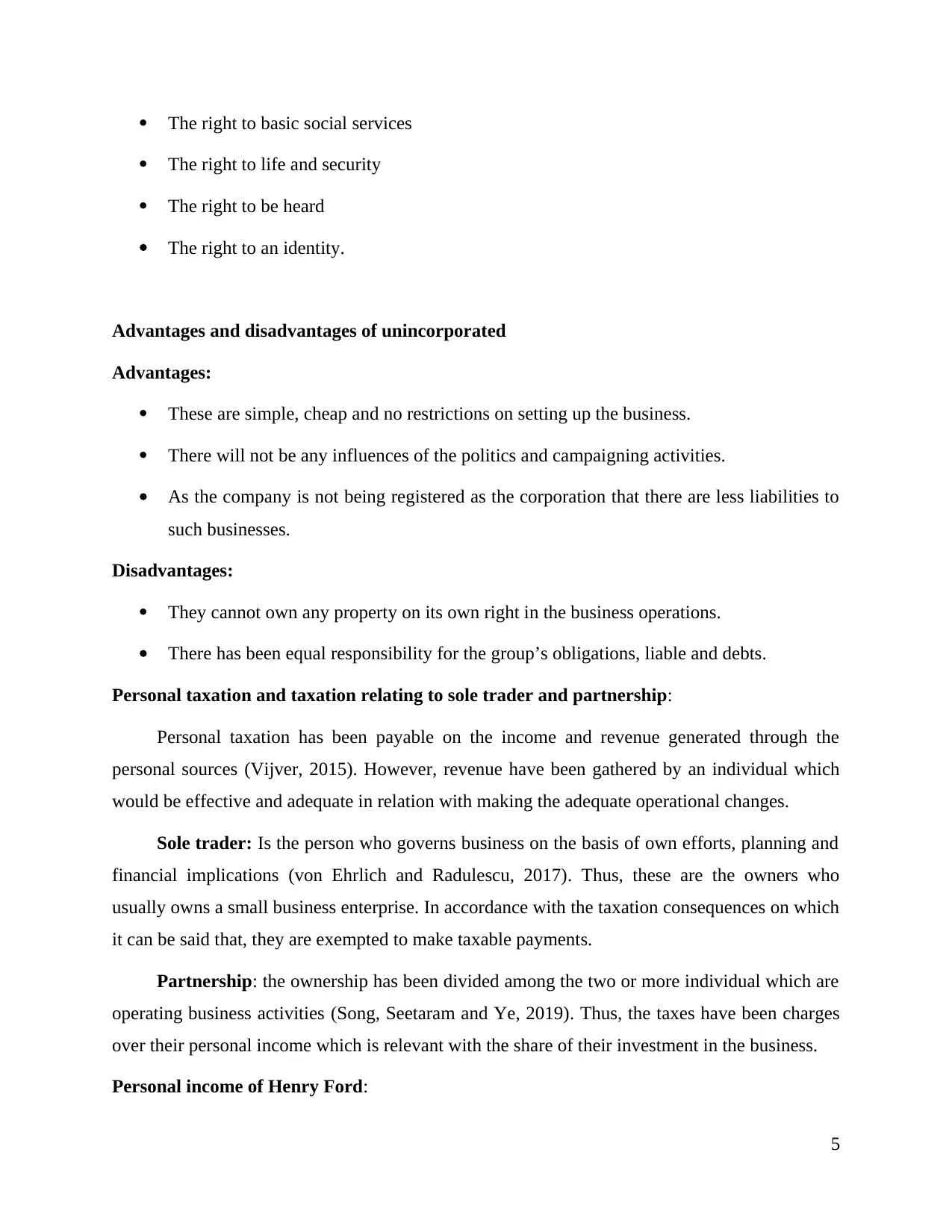
The right to basic social services
The right to life and security
The right to be heard
The right to an identity.
Advantages and disadvantages of unincorporated
Advantages:
These are simple, cheap and no restrictions on setting up the business.
There will not be any influences of the politics and campaigning activities.
As the company is not being registered as the corporation that there are less liabilities to
such businesses.
Disadvantages:
They cannot own any property on its own right in the business operations.
There has been equal responsibility for the group’s obligations, liable and debts.
Personal taxation and taxation relating to sole trader and partnership:
Personal taxation has been payable on the income and revenue generated through the
personal sources (Vijver, 2015). However, revenue have been gathered by an individual which
would be effective and adequate in relation with making the adequate operational changes.
Sole trader: Is the person who governs business on the basis of own efforts, planning and
financial implications (von Ehrlich and Radulescu, 2017). Thus, these are the owners who
usually owns a small business enterprise. In accordance with the taxation consequences on which
it can be said that, they are exempted to make taxable payments.
Partnership: the ownership has been divided among the two or more individual which are
operating business activities (Song, Seetaram and Ye, 2019). Thus, the taxes have been charges
over their personal income which is relevant with the share of their investment in the business.
Personal income of Henry Ford:
5
The right to life and security
The right to be heard
The right to an identity.
Advantages and disadvantages of unincorporated
Advantages:
These are simple, cheap and no restrictions on setting up the business.
There will not be any influences of the politics and campaigning activities.
As the company is not being registered as the corporation that there are less liabilities to
such businesses.
Disadvantages:
They cannot own any property on its own right in the business operations.
There has been equal responsibility for the group’s obligations, liable and debts.
Personal taxation and taxation relating to sole trader and partnership:
Personal taxation has been payable on the income and revenue generated through the
personal sources (Vijver, 2015). However, revenue have been gathered by an individual which
would be effective and adequate in relation with making the adequate operational changes.
Sole trader: Is the person who governs business on the basis of own efforts, planning and
financial implications (von Ehrlich and Radulescu, 2017). Thus, these are the owners who
usually owns a small business enterprise. In accordance with the taxation consequences on which
it can be said that, they are exempted to make taxable payments.
Partnership: the ownership has been divided among the two or more individual which are
operating business activities (Song, Seetaram and Ye, 2019). Thus, the taxes have been charges
over their personal income which is relevant with the share of their investment in the business.
Personal income of Henry Ford:
5
Paraphrase This Document
Need a fresh take? Get an instant paraphrase of this document with our AI Paraphraser
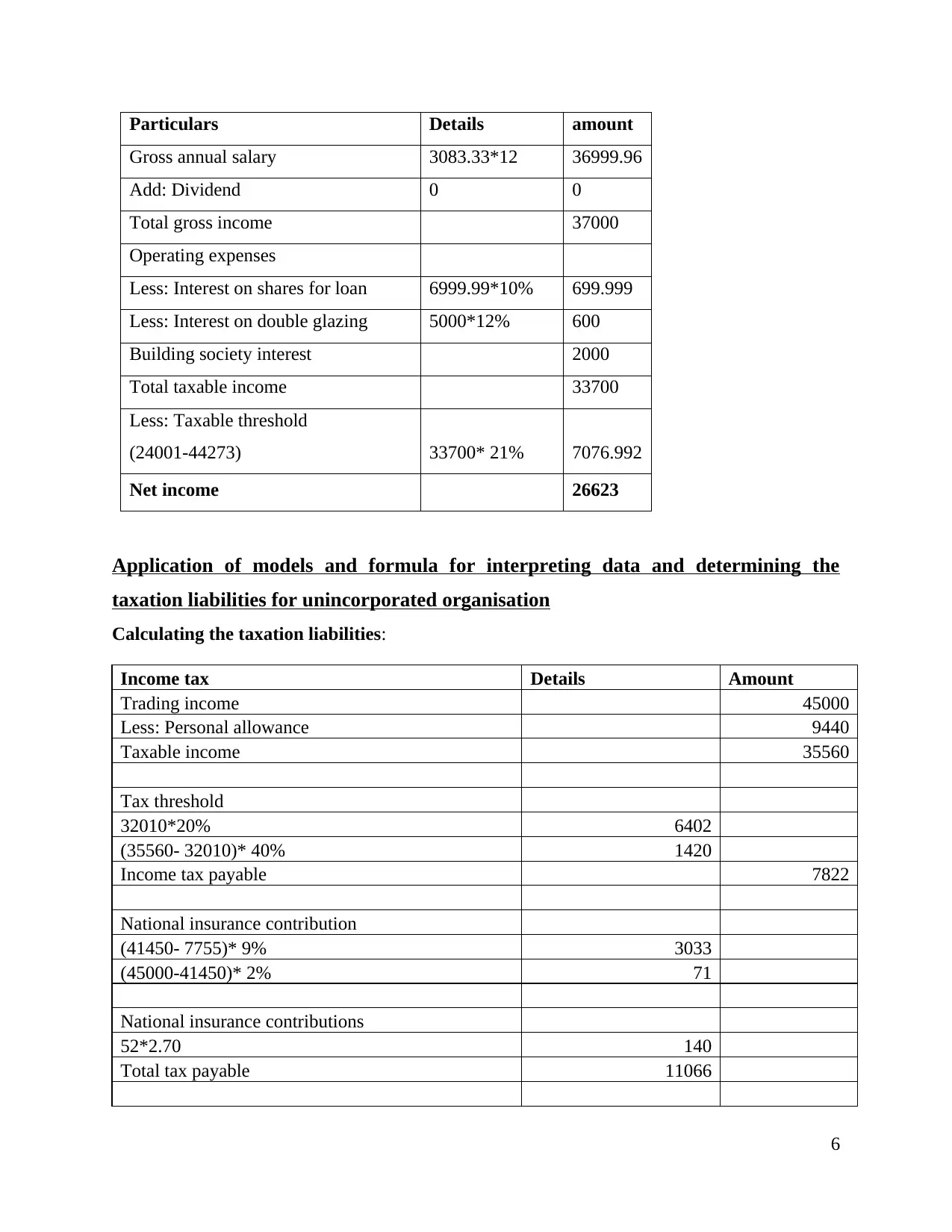
Particulars Details amount
Gross annual salary 3083.33*12 36999.96
Add: Dividend 0 0
Total gross income 37000
Operating expenses
Less: Interest on shares for loan 6999.99*10% 699.999
Less: Interest on double glazing 5000*12% 600
Building society interest 2000
Total taxable income 33700
Less: Taxable threshold
(24001-44273) 33700* 21% 7076.992
Net income 26623
Application of models and formula for interpreting data and determining the
taxation liabilities for unincorporated organisation
Calculating the taxation liabilities:
Income tax Details Amount
Trading income 45000
Less: Personal allowance 9440
Taxable income 35560
Tax threshold
32010*20% 6402
(35560- 32010)* 40% 1420
Income tax payable 7822
National insurance contribution
(41450- 7755)* 9% 3033
(45000-41450)* 2% 71
National insurance contributions
52*2.70 140
Total tax payable 11066
6
Gross annual salary 3083.33*12 36999.96
Add: Dividend 0 0
Total gross income 37000
Operating expenses
Less: Interest on shares for loan 6999.99*10% 699.999
Less: Interest on double glazing 5000*12% 600
Building society interest 2000
Total taxable income 33700
Less: Taxable threshold
(24001-44273) 33700* 21% 7076.992
Net income 26623
Application of models and formula for interpreting data and determining the
taxation liabilities for unincorporated organisation
Calculating the taxation liabilities:
Income tax Details Amount
Trading income 45000
Less: Personal allowance 9440
Taxable income 35560
Tax threshold
32010*20% 6402
(35560- 32010)* 40% 1420
Income tax payable 7822
National insurance contribution
(41450- 7755)* 9% 3033
(45000-41450)* 2% 71
National insurance contributions
52*2.70 140
Total tax payable 11066
6
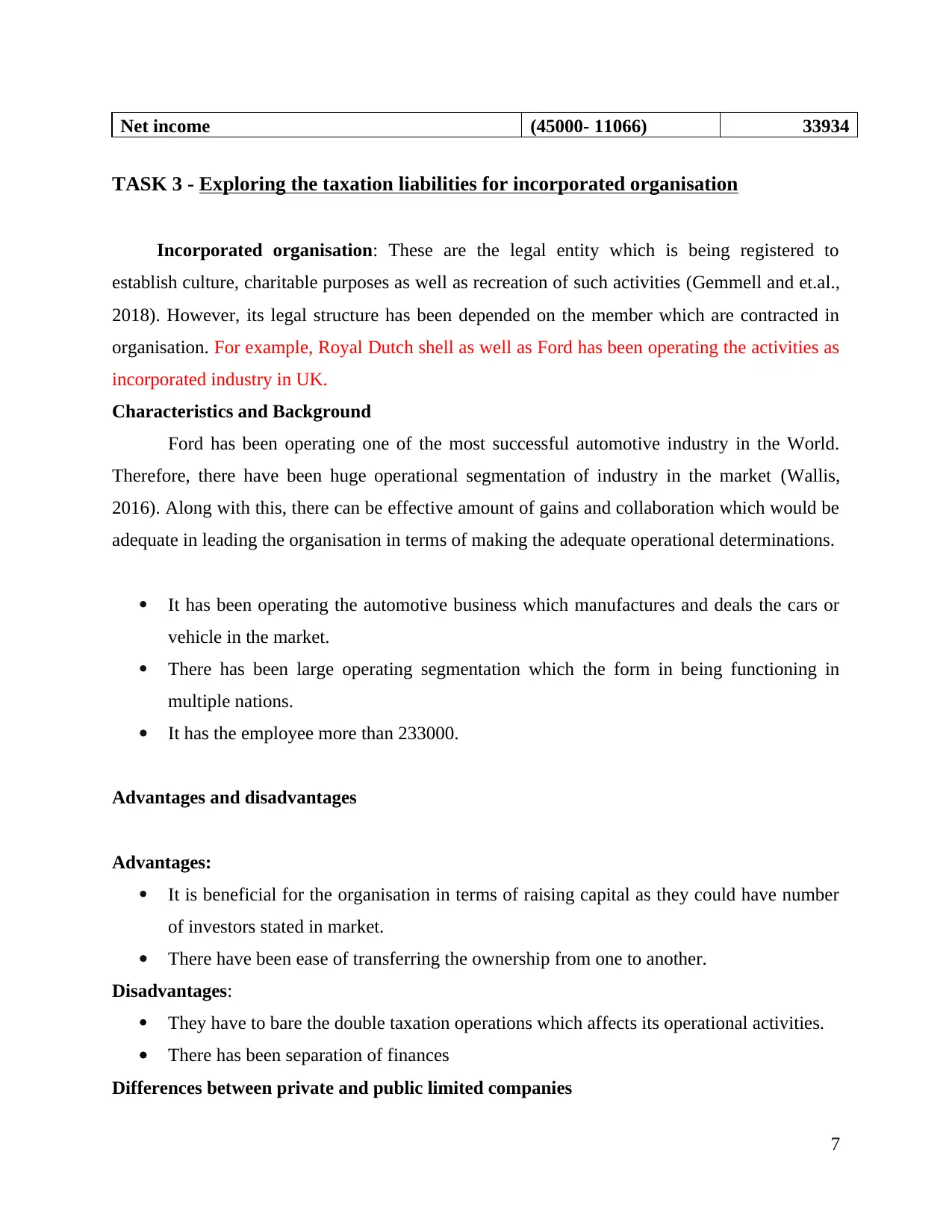
Net income (45000- 11066) 33934
TASK 3 - Exploring the taxation liabilities for incorporated organisation
Incorporated organisation: These are the legal entity which is being registered to
establish culture, charitable purposes as well as recreation of such activities (Gemmell and et.al.,
2018). However, its legal structure has been depended on the member which are contracted in
organisation. For example, Royal Dutch shell as well as Ford has been operating the activities as
incorporated industry in UK.
Characteristics and Background
Ford has been operating one of the most successful automotive industry in the World.
Therefore, there have been huge operational segmentation of industry in the market (Wallis,
2016). Along with this, there can be effective amount of gains and collaboration which would be
adequate in leading the organisation in terms of making the adequate operational determinations.
It has been operating the automotive business which manufactures and deals the cars or
vehicle in the market.
There has been large operating segmentation which the form in being functioning in
multiple nations.
It has the employee more than 233000.
Advantages and disadvantages
Advantages:
It is beneficial for the organisation in terms of raising capital as they could have number
of investors stated in market.
There have been ease of transferring the ownership from one to another.
Disadvantages:
They have to bare the double taxation operations which affects its operational activities.
There has been separation of finances
Differences between private and public limited companies
7
TASK 3 - Exploring the taxation liabilities for incorporated organisation
Incorporated organisation: These are the legal entity which is being registered to
establish culture, charitable purposes as well as recreation of such activities (Gemmell and et.al.,
2018). However, its legal structure has been depended on the member which are contracted in
organisation. For example, Royal Dutch shell as well as Ford has been operating the activities as
incorporated industry in UK.
Characteristics and Background
Ford has been operating one of the most successful automotive industry in the World.
Therefore, there have been huge operational segmentation of industry in the market (Wallis,
2016). Along with this, there can be effective amount of gains and collaboration which would be
adequate in leading the organisation in terms of making the adequate operational determinations.
It has been operating the automotive business which manufactures and deals the cars or
vehicle in the market.
There has been large operating segmentation which the form in being functioning in
multiple nations.
It has the employee more than 233000.
Advantages and disadvantages
Advantages:
It is beneficial for the organisation in terms of raising capital as they could have number
of investors stated in market.
There have been ease of transferring the ownership from one to another.
Disadvantages:
They have to bare the double taxation operations which affects its operational activities.
There has been separation of finances
Differences between private and public limited companies
7
⊘ This is a preview!⊘
Do you want full access?
Subscribe today to unlock all pages.

Trusted by 1+ million students worldwide
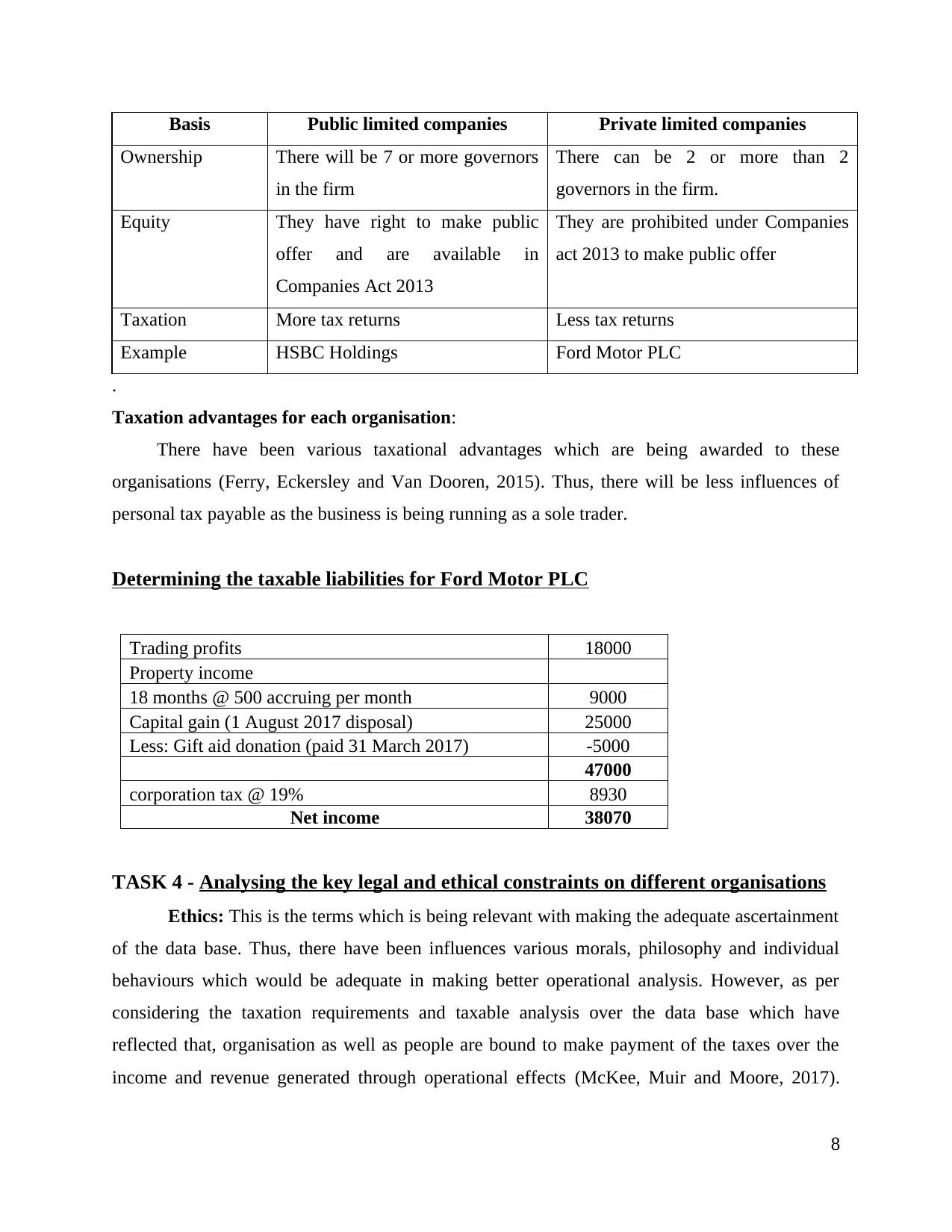
Basis Public limited companies Private limited companies
Ownership There will be 7 or more governors
in the firm
There can be 2 or more than 2
governors in the firm.
Equity They have right to make public
offer and are available in
Companies Act 2013
They are prohibited under Companies
act 2013 to make public offer
Taxation More tax returns Less tax returns
Example HSBC Holdings Ford Motor PLC
.
Taxation advantages for each organisation:
There have been various taxational advantages which are being awarded to these
organisations (Ferry, Eckersley and Van Dooren, 2015). Thus, there will be less influences of
personal tax payable as the business is being running as a sole trader.
Determining the taxable liabilities for Ford Motor PLC
Trading profits 18000
Property income
18 months @ 500 accruing per month 9000
Capital gain (1 August 2017 disposal) 25000
Less: Gift aid donation (paid 31 March 2017) -5000
47000
corporation tax @ 19% 8930
Net income 38070
TASK 4 - Analysing the key legal and ethical constraints on different organisations
Ethics: This is the terms which is being relevant with making the adequate ascertainment
of the data base. Thus, there have been influences various morals, philosophy and individual
behaviours which would be adequate in making better operational analysis. However, as per
considering the taxation requirements and taxable analysis over the data base which have
reflected that, organisation as well as people are bound to make payment of the taxes over the
income and revenue generated through operational effects (McKee, Muir and Moore, 2017).
8
Ownership There will be 7 or more governors
in the firm
There can be 2 or more than 2
governors in the firm.
Equity They have right to make public
offer and are available in
Companies Act 2013
They are prohibited under Companies
act 2013 to make public offer
Taxation More tax returns Less tax returns
Example HSBC Holdings Ford Motor PLC
.
Taxation advantages for each organisation:
There have been various taxational advantages which are being awarded to these
organisations (Ferry, Eckersley and Van Dooren, 2015). Thus, there will be less influences of
personal tax payable as the business is being running as a sole trader.
Determining the taxable liabilities for Ford Motor PLC
Trading profits 18000
Property income
18 months @ 500 accruing per month 9000
Capital gain (1 August 2017 disposal) 25000
Less: Gift aid donation (paid 31 March 2017) -5000
47000
corporation tax @ 19% 8930
Net income 38070
TASK 4 - Analysing the key legal and ethical constraints on different organisations
Ethics: This is the terms which is being relevant with making the adequate ascertainment
of the data base. Thus, there have been influences various morals, philosophy and individual
behaviours which would be adequate in making better operational analysis. However, as per
considering the taxation requirements and taxable analysis over the data base which have
reflected that, organisation as well as people are bound to make payment of the taxes over the
income and revenue generated through operational effects (McKee, Muir and Moore, 2017).
8
Paraphrase This Document
Need a fresh take? Get an instant paraphrase of this document with our AI Paraphraser
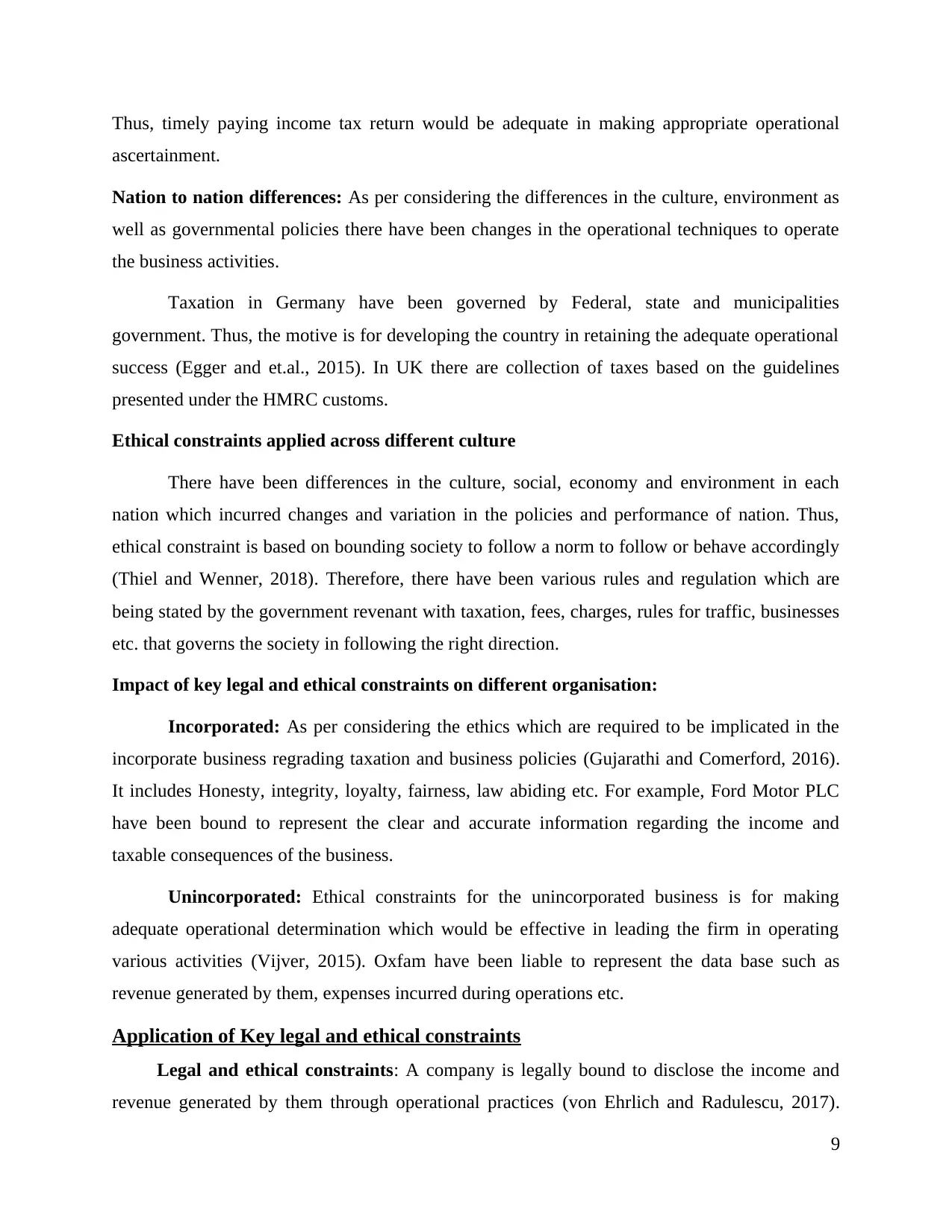
Thus, timely paying income tax return would be adequate in making appropriate operational
ascertainment.
Nation to nation differences: As per considering the differences in the culture, environment as
well as governmental policies there have been changes in the operational techniques to operate
the business activities.
Taxation in Germany have been governed by Federal, state and municipalities
government. Thus, the motive is for developing the country in retaining the adequate operational
success (Egger and et.al., 2015). In UK there are collection of taxes based on the guidelines
presented under the HMRC customs.
Ethical constraints applied across different culture
There have been differences in the culture, social, economy and environment in each
nation which incurred changes and variation in the policies and performance of nation. Thus,
ethical constraint is based on bounding society to follow a norm to follow or behave accordingly
(Thiel and Wenner, 2018). Therefore, there have been various rules and regulation which are
being stated by the government revenant with taxation, fees, charges, rules for traffic, businesses
etc. that governs the society in following the right direction.
Impact of key legal and ethical constraints on different organisation:
Incorporated: As per considering the ethics which are required to be implicated in the
incorporate business regrading taxation and business policies (Gujarathi and Comerford, 2016).
It includes Honesty, integrity, loyalty, fairness, law abiding etc. For example, Ford Motor PLC
have been bound to represent the clear and accurate information regarding the income and
taxable consequences of the business.
Unincorporated: Ethical constraints for the unincorporated business is for making
adequate operational determination which would be effective in leading the firm in operating
various activities (Vijver, 2015). Oxfam have been liable to represent the data base such as
revenue generated by them, expenses incurred during operations etc.
Application of Key legal and ethical constraints
Legal and ethical constraints: A company is legally bound to disclose the income and
revenue generated by them through operational practices (von Ehrlich and Radulescu, 2017).
9
ascertainment.
Nation to nation differences: As per considering the differences in the culture, environment as
well as governmental policies there have been changes in the operational techniques to operate
the business activities.
Taxation in Germany have been governed by Federal, state and municipalities
government. Thus, the motive is for developing the country in retaining the adequate operational
success (Egger and et.al., 2015). In UK there are collection of taxes based on the guidelines
presented under the HMRC customs.
Ethical constraints applied across different culture
There have been differences in the culture, social, economy and environment in each
nation which incurred changes and variation in the policies and performance of nation. Thus,
ethical constraint is based on bounding society to follow a norm to follow or behave accordingly
(Thiel and Wenner, 2018). Therefore, there have been various rules and regulation which are
being stated by the government revenant with taxation, fees, charges, rules for traffic, businesses
etc. that governs the society in following the right direction.
Impact of key legal and ethical constraints on different organisation:
Incorporated: As per considering the ethics which are required to be implicated in the
incorporate business regrading taxation and business policies (Gujarathi and Comerford, 2016).
It includes Honesty, integrity, loyalty, fairness, law abiding etc. For example, Ford Motor PLC
have been bound to represent the clear and accurate information regarding the income and
taxable consequences of the business.
Unincorporated: Ethical constraints for the unincorporated business is for making
adequate operational determination which would be effective in leading the firm in operating
various activities (Vijver, 2015). Oxfam have been liable to represent the data base such as
revenue generated by them, expenses incurred during operations etc.
Application of Key legal and ethical constraints
Legal and ethical constraints: A company is legally bound to disclose the income and
revenue generated by them through operational practices (von Ehrlich and Radulescu, 2017).
9
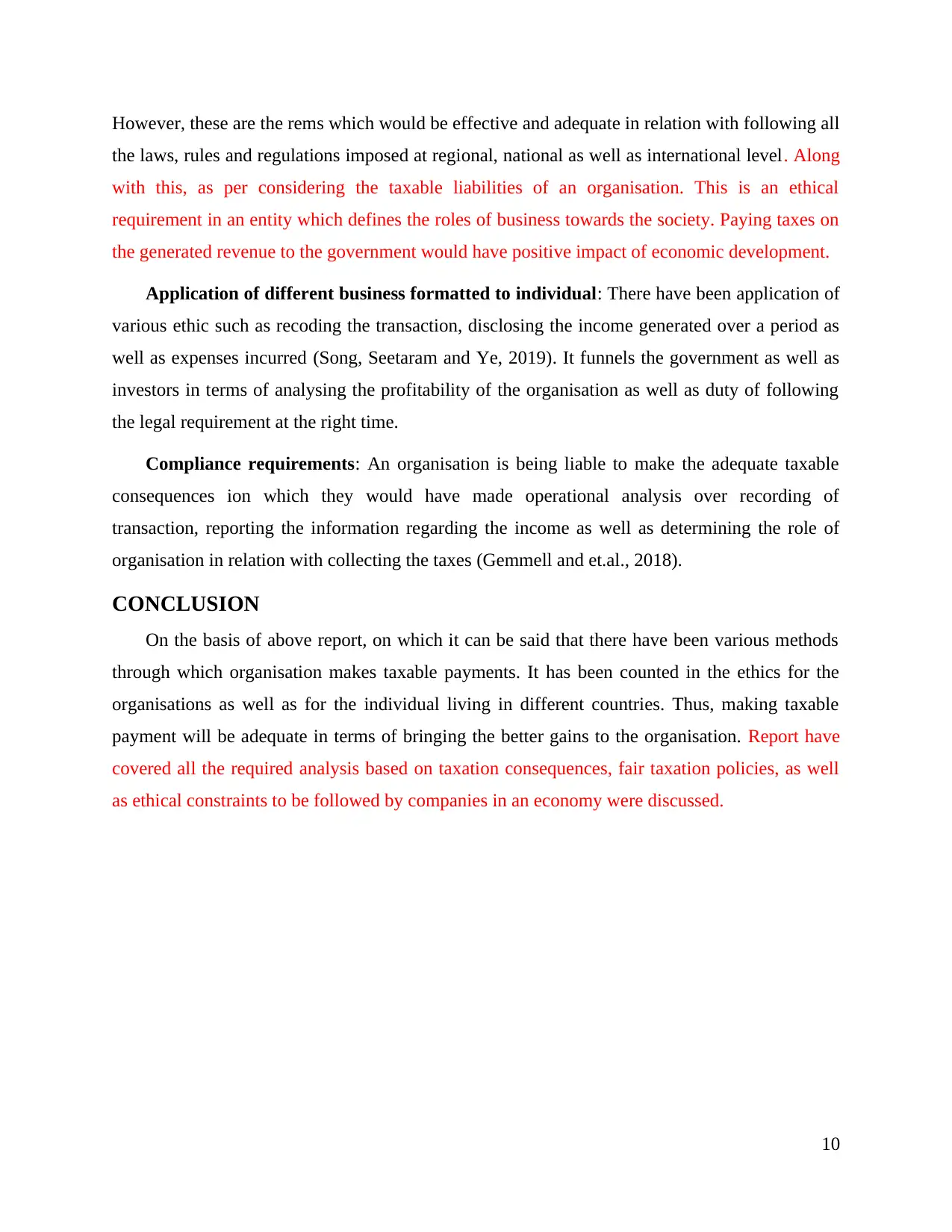
However, these are the rems which would be effective and adequate in relation with following all
the laws, rules and regulations imposed at regional, national as well as international level. Along
with this, as per considering the taxable liabilities of an organisation. This is an ethical
requirement in an entity which defines the roles of business towards the society. Paying taxes on
the generated revenue to the government would have positive impact of economic development.
Application of different business formatted to individual: There have been application of
various ethic such as recoding the transaction, disclosing the income generated over a period as
well as expenses incurred (Song, Seetaram and Ye, 2019). It funnels the government as well as
investors in terms of analysing the profitability of the organisation as well as duty of following
the legal requirement at the right time.
Compliance requirements: An organisation is being liable to make the adequate taxable
consequences ion which they would have made operational analysis over recording of
transaction, reporting the information regarding the income as well as determining the role of
organisation in relation with collecting the taxes (Gemmell and et.al., 2018).
CONCLUSION
On the basis of above report, on which it can be said that there have been various methods
through which organisation makes taxable payments. It has been counted in the ethics for the
organisations as well as for the individual living in different countries. Thus, making taxable
payment will be adequate in terms of bringing the better gains to the organisation. Report have
covered all the required analysis based on taxation consequences, fair taxation policies, as well
as ethical constraints to be followed by companies in an economy were discussed.
10
the laws, rules and regulations imposed at regional, national as well as international level. Along
with this, as per considering the taxable liabilities of an organisation. This is an ethical
requirement in an entity which defines the roles of business towards the society. Paying taxes on
the generated revenue to the government would have positive impact of economic development.
Application of different business formatted to individual: There have been application of
various ethic such as recoding the transaction, disclosing the income generated over a period as
well as expenses incurred (Song, Seetaram and Ye, 2019). It funnels the government as well as
investors in terms of analysing the profitability of the organisation as well as duty of following
the legal requirement at the right time.
Compliance requirements: An organisation is being liable to make the adequate taxable
consequences ion which they would have made operational analysis over recording of
transaction, reporting the information regarding the income as well as determining the role of
organisation in relation with collecting the taxes (Gemmell and et.al., 2018).
CONCLUSION
On the basis of above report, on which it can be said that there have been various methods
through which organisation makes taxable payments. It has been counted in the ethics for the
organisations as well as for the individual living in different countries. Thus, making taxable
payment will be adequate in terms of bringing the better gains to the organisation. Report have
covered all the required analysis based on taxation consequences, fair taxation policies, as well
as ethical constraints to be followed by companies in an economy were discussed.
10
⊘ This is a preview!⊘
Do you want full access?
Subscribe today to unlock all pages.

Trusted by 1+ million students worldwide
1 out of 13
Related Documents
Your All-in-One AI-Powered Toolkit for Academic Success.
+13062052269
info@desklib.com
Available 24*7 on WhatsApp / Email
![[object Object]](/_next/static/media/star-bottom.7253800d.svg)
Unlock your academic potential
Copyright © 2020–2026 A2Z Services. All Rights Reserved. Developed and managed by ZUCOL.





